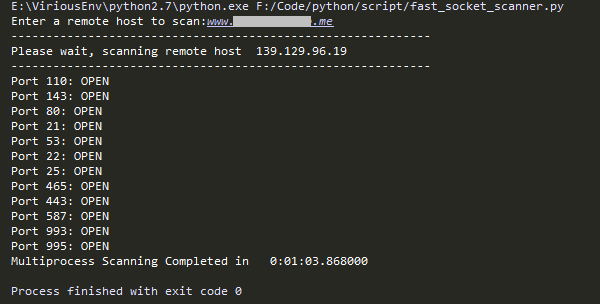『Python』 多线程 端口扫描器
0x 00 Before Coding
当端口打开时,向端口发送 TCP SYN 请求,会返回一个 ACK 响应:

当端口关闭,返回的是 RST 响应:

0x 01 Coding
可以用 socket 编写一个小脚本来测试主机端口的开启情况,基本代码如下:
1 # coding: utf-8
2
3 import socket
4 from datetime import datetime
5
6 # Set time-out to get the scanning fast
7 socket.setdefaulttimeout(0.5)
8
9 # Ask for input
10 remote_server = raw_input("Enter a remote host to scan:")
11 remote_server_ip = socket.gethostbyname(remote_server)
12
13 # Print a nice banner with info on which host we are about to scan
14 print '-' * 60
15 print 'Please wait, scanning remote host ', remote_server_ip
16 print '-' * 60
17
18 # Check what time the scan started
19 t1 = datetime.now()
20
21 # Using the range function to specify ports(1 - 1024)
22 # We also put in some error handling for catching errors
23 try:
24 for port in range(1,1025):
25 sock = socket.socket(2,1) # 2:socket.AF_INET 1:socket.SOCK_STREAM
26 res = sock.connect_ex((remote_server_ip,port))
27 if res == 0:
28 print 'Port {}: OPEN'.format(port)
29 sock.close()
30
31 except socket.gaierror:
32 print 'Hostname could not be resolved.Exiting'
33
34 except socket.error:
35 print "Could't connect to the server"
36
37 # Check the time now
38 t2 = datetime.now()
39
40 # Calculates the difference of time
41 total = t2 - t1
42
43 # Print the info to screen
44 print 'Scanning Completed in: ', total
参考:http://www.pythonforbeginners.com/code-snippets-source-code/port-scanner-in-python/
程序测试结果如下:

看出来 在 socket 的超时时间设置为0.5的前提下 依然需要花费 8分27秒才能够把周知端口号扫完,有没有其他方式加快扫描速度?答案是有的。
//////////////////// ******************** 该部分可以略过,一个小坑 ************************ ////////////////////
打开 抓到的数据包列表,发现 timeout 包都会发送2个“伪重传”,发送这两个一般没什么用的数据包会占用 CPU的处理时间,
所以在想能不能不让程序发这两个包来提高效率??
自己分析连续两个端口的时间间隔就会发现:间隔是0.5s(由 39号、46号、53号数据包分析得出),这恰好是在程序中设置的超时时间,
也就是说超时重传的包并不会占用专门的时间,所以这种想法就被干掉了。

这样的话,1个端口0.5的超时等待,扫描一个主机的 1- 1024 号端口所用时间是可以大致估算下的:
1024 * 0.5 / 60 = 8.53 分钟左右。和上面程序实际扫描的时间(8分27秒)相符合。
//////////////////// ******************** 坑结束 ************************ ////////////////////
0x 02 Better Coding
所以对于这种时间主要花费在 socket 连接( 非 CPU 计算密集型 )的程序 可以使用 多线程来提升效率,
这里选择使用内建的库 multiprocessing.dummy 来实现多线程扫描:
# coding: utf-8 '''
多线程 Socket TCP 端口扫描器 by: EvilCLAY
''' import socket from datetime import datetime from multiprocessing.dummy import Pool as ThreadPool remote_server = raw_input("Enter a remote host to scan:") remote_server_ip = socket.gethostbyname(remote_server) ports = [] print '-' * 60 print 'Please wait, scanning remote host ', remote_server_ip print '-' * 60 socket.setdefaulttimeout(0.5) def scan_port(port): try: s = socket.socket(2,1) res = s.connect_ex((remote_server_ip,port)) if res == 0: # 如果端口开启 发送 hello 获取banner print 'Port {}: OPEN'.format(port) s.close() except Exception,e: print str(e.message) for i in range(1,1025): ports.append(i) # Check what time the scan started t1 = datetime.now() pool = ThreadPool(processes = 8) results = pool.map(scan_port,ports) pool.close() pool.join() print 'Multiprocess Scanning Completed in ', datetime.now() - t1
扫描的结果如下:

可以发现 8 个线程并行发起请求,效率有很大的提升。
在被扫描主机未安装连接限制软件的前提下,测试了开启不同线程扫描所花费的时间 :
16 个线程 使用 32 秒扫完;
32个线程,使用 16 秒扫完;
64个线程,使用 8 秒扫完;
128个线程,使用 4 秒扫完;
256个线程,使用 2 秒扫完;
512个线程,使用 1.50 秒扫完;
1024个线程,使用 1.25 秒扫完;
获取 Banner
把 函数修改成如下 即可:
def scan_port(port):
try:
s = socket.socket(2,1)
res = s.connect_ex((remote_server_ip,port))
if res == 0: # 如果端口开启 发送 hello 获取banner
try:
s.send('hello')
banner = s.recv(1024)
except Exception,e:
print 'Port {}: OPEN'.format(port)
print str(e.message)
else:
print 'Port {}: OPEN'.format(port)
print 'Banner {}'.format(banner)
s.close()
except Exception,e:
print str(e.message)
晚上研究下 Zmap 与 ZGrab 分析下 这两款神器牛在什么地方 ~~



 浙公网安备 33010602011771号
浙公网安备 33010602011771号